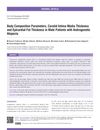 January 2022 in “International journal of zoological investigations”
January 2022 in “International journal of zoological investigations” Polycystic Ovarian Syndrome is common in overweight urban college girls and may increase the risk of heart and metabolic problems.
 2 citations,
December 2021 in “Cureus”
2 citations,
December 2021 in “Cureus” Most women with Polycystic Ovary Syndrome (PCOS) have skin issues like excessive hair, acne, or hair loss. Hormone imbalances are common, and age, certain hormones, and hormone ratios can predict acne. Obesity, infertility, and high cholesterol are also common in these women.
 September 2023 in “Journal of the turkish academy of dermatology”
September 2023 in “Journal of the turkish academy of dermatology” Men with male pattern baldness had higher body fat and obesity-related measurements but similar heart fat and artery thickness compared to healthy men.
 9 citations,
February 2020 in “International Journal of Endocrinology”
9 citations,
February 2020 in “International Journal of Endocrinology” Some men with early hair loss may have a male version of PCOS, affecting hormones and increasing health risks.
 December 2023 in “Frontiers in endocrinology”
December 2023 in “Frontiers in endocrinology” Excess androgens may cause PCOS, not just be a symptom.
 1 citations,
January 2023 in “Metabolites”
1 citations,
January 2023 in “Metabolites” Changes in gut bacteria can contribute to the development of Polycystic Ovary Syndrome (PCOS), affecting metabolism, immunity, and causing inflammation. Treatments may involve adjusting these factors.
 883 citations,
August 2016 in “Nature Reviews Disease Primers”
883 citations,
August 2016 in “Nature Reviews Disease Primers” Polycystic Ovary Syndrome (PCOS) is a common condition in women that can cause metabolic, reproductive, and psychological issues, and requires lifestyle changes and medication for management.
 1 citations,
June 2023 in “Curēus”
1 citations,
June 2023 in “Curēus” PCOS affects nearly 25% of female medical and dental students, impacting their academic and social lives.
 4 citations,
October 2022 in “Nutrients”
4 citations,
October 2022 in “Nutrients” Personalized diets, like the Mediterranean Diet and low carb diets, can help manage PCOS symptoms in obese women, and probiotics may enhance weight loss and improve metabolic health. More research is needed to find the best diet strategies.
 1 citations,
June 2012 in “Springer eBooks”
1 citations,
June 2012 in “Springer eBooks” Acupuncture may improve reproductive and metabolic functions in PCOS without negative side effects, but more research is needed to confirm its effectiveness.
 6 citations,
March 2015 in “Journal of Endocrinological Investigation”
6 citations,
March 2015 in “Journal of Endocrinological Investigation” Taking both finasteride and dutasteride for prostate issues may raise the risk of heart problems.
 17 citations,
February 2019 in “Journal of Clinical Medicine”
17 citations,
February 2019 in “Journal of Clinical Medicine” Testosterone replacement therapy should be used for men with low testosterone levels and symptoms of hypogonadism, after careful diagnosis and considering individual needs.
 200 citations,
October 2009 in “European journal of endocrinology”
200 citations,
October 2009 in “European journal of endocrinology” Metformin helps manage polycystic ovary syndrome by improving insulin resistance and ovulation, but more research is needed on its full effects.
 December 2023 in “Clinical, cosmetic and investigational dermatology”
December 2023 in “Clinical, cosmetic and investigational dermatology” The new method combining dermoscopy and Reflectance Confocal Microscopy is more effective for evaluating vitiligo.
 47 citations,
May 2020 in “Cardiovascular Research”
47 citations,
May 2020 in “Cardiovascular Research” The document concludes that future heart disease research should account for sex-specific differences to improve diagnosis, treatment, and outcomes.
 29 citations,
October 2020 in “eLife”
29 citations,
October 2020 in “eLife” Higher testosterone levels can increase the risk of certain diseases like type 2 diabetes in women and prostate cancer in men, but can also protect against autoimmune diseases and hair loss. It also affects body fat and bone density.
 58 citations,
November 2020 in “International Journal of Molecular Sciences”
58 citations,
November 2020 in “International Journal of Molecular Sciences” SHBG may be a useful early indicator and treatment target for PCOS.
 August 2020 in “International research journal of pharmacy”
August 2020 in “International research journal of pharmacy” Lifestyle changes and medication can improve the quality of life for women with PCOS by reducing complications.

Increased free testosterone can lead to stronger bones and less body fat but also higher risks of prostate cancer, hair loss, spine issues, and high blood pressure.
 February 2020 in “İstanbul medical journal”
February 2020 in “İstanbul medical journal” Metformin improves early signs of heart disease in women with PCOS and raises apelin levels, but doesn't significantly change artery thickness.
 19 citations,
November 2021 in “Reviews in endocrine and metabolic disorders”
19 citations,
November 2021 in “Reviews in endocrine and metabolic disorders” Sex hormones like estrogen and testosterone may affect COVID-19 severity differently in men and women, potentially influencing prevention and treatment strategies.
 17 citations,
May 2019 in “Diabetes and Metabolic Syndrome: Clinical Research and Reviews”
17 citations,
May 2019 in “Diabetes and Metabolic Syndrome: Clinical Research and Reviews” High fasting insulin levels in women with PCOS are linked to a higher risk of heart and metabolic problems.
 15 citations,
April 2019 in “Best Practice & Research Clinical Endocrinology & Metabolism”
15 citations,
April 2019 in “Best Practice & Research Clinical Endocrinology & Metabolism” Polycystic Ovary Syndrome (PCOS) in teenagers is a complex condition linked to genetics and environment, often associated with obesity and insulin resistance, and is treated with lifestyle changes and medication.
 20 citations,
June 2017 in “Hormone Molecular Biology and Clinical Investigation”
20 citations,
June 2017 in “Hormone Molecular Biology and Clinical Investigation” Long-term use of dutasteride for enlarged prostate may worsen blood sugar, cholesterol, and erectile dysfunction.
 13 citations,
March 2019 in “Physiological Research”
13 citations,
March 2019 in “Physiological Research” Overweight women with PCOS have higher levels of certain hormones that could indicate a higher risk of heart and metabolic problems.
 2 citations,
April 2019 in “Медицинский совет”
2 citations,
April 2019 in “Медицинский совет” Combined oral contraceptives improve skin, hormone levels, and quality of life in women with PCOS.
 August 2023 in “MOJ women's health”
August 2023 in “MOJ women's health” Brown Adipose Tissue (BAT) could potentially treat Polycystic Ovary Syndrome (PCOS) by controlling energy balance and lipid homeostasis, but more human research is needed.
 January 2014 in “S. Karger AG eBooks”
January 2014 in “S. Karger AG eBooks” Type 2 diabetes in youth is increasing, with high treatment failure rates and more severe than Type 1; certain drugs can lower lipid levels effectively with varying side effects, and apples may benefit heart health like statins but with fewer side effects.
 January 2022 in “Journal of current research in food science”
January 2022 in “Journal of current research in food science” Eating healthy and exercising can help manage Polycystic Ovarian Syndrome and its related health problems.
 3 citations,
May 2018 in “Experimental Dermatology”
3 citations,
May 2018 in “Experimental Dermatology” Young HS patients often have other physical and mental health issues, and research on HS covers a wide range of topics including genetics, triggers, treatments, and the need for more data.





























